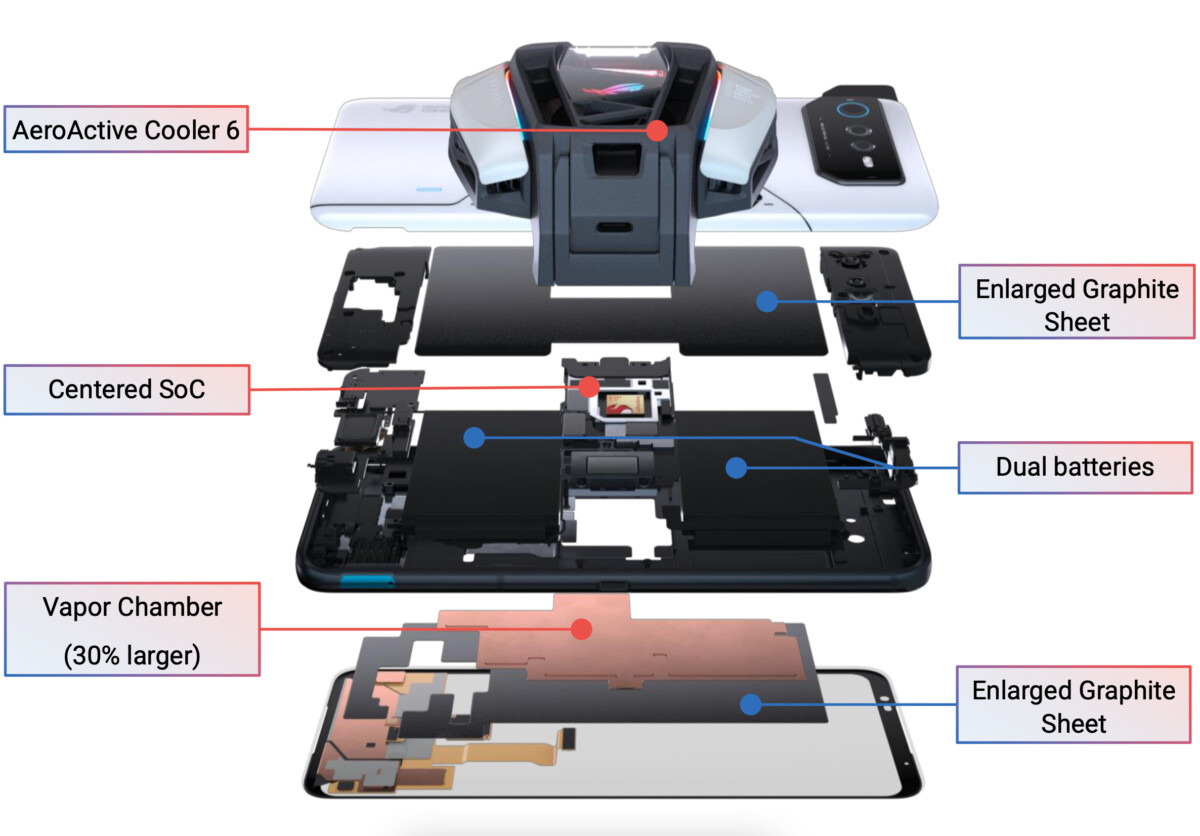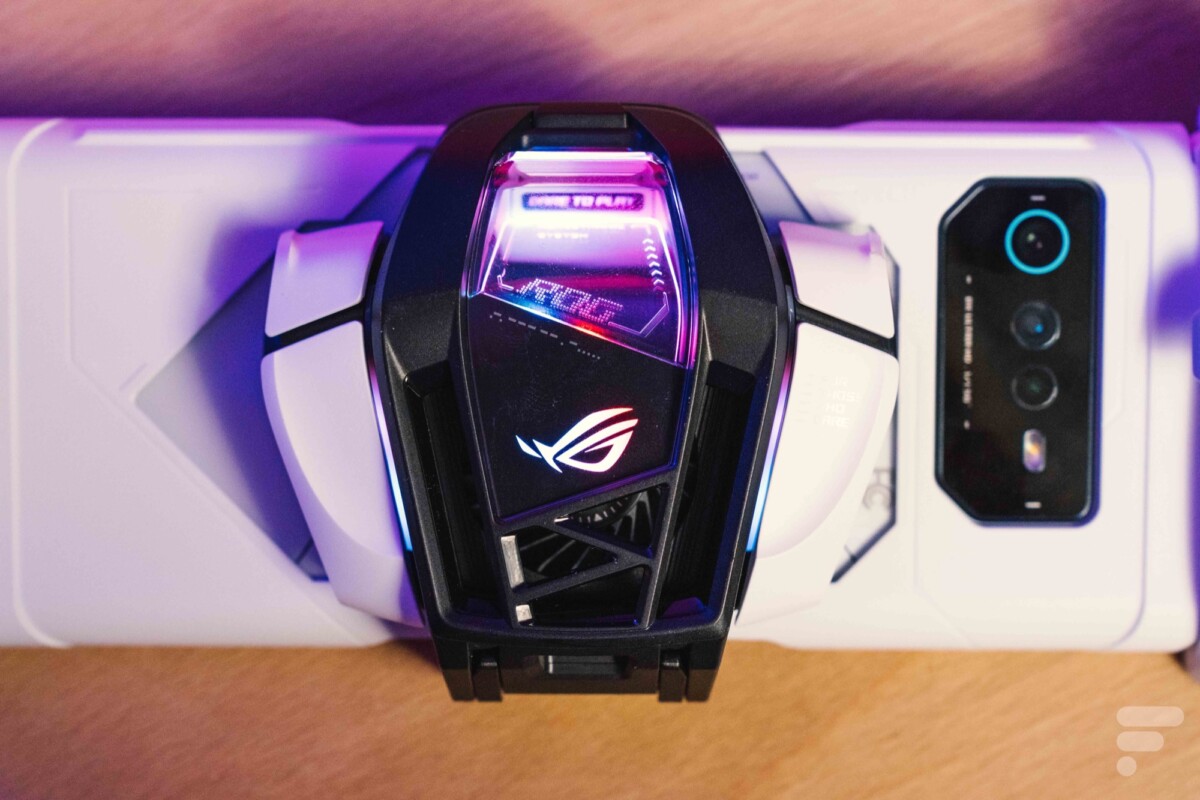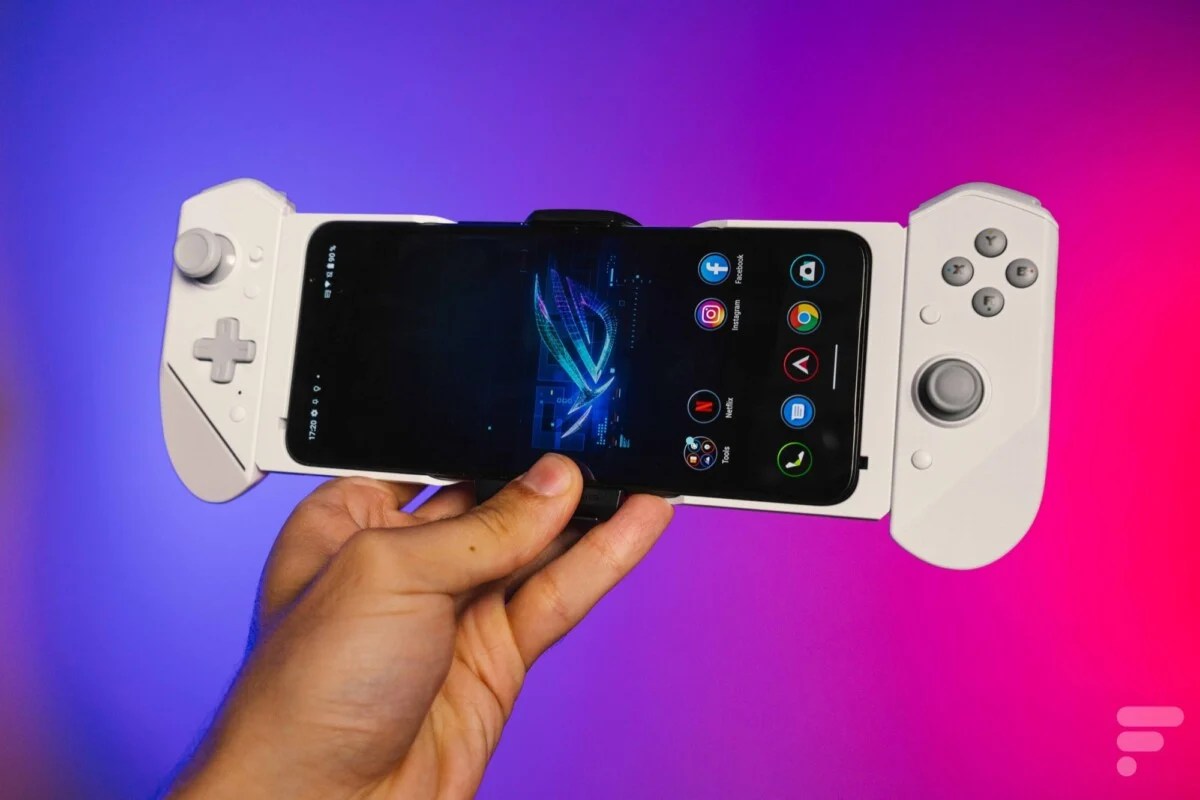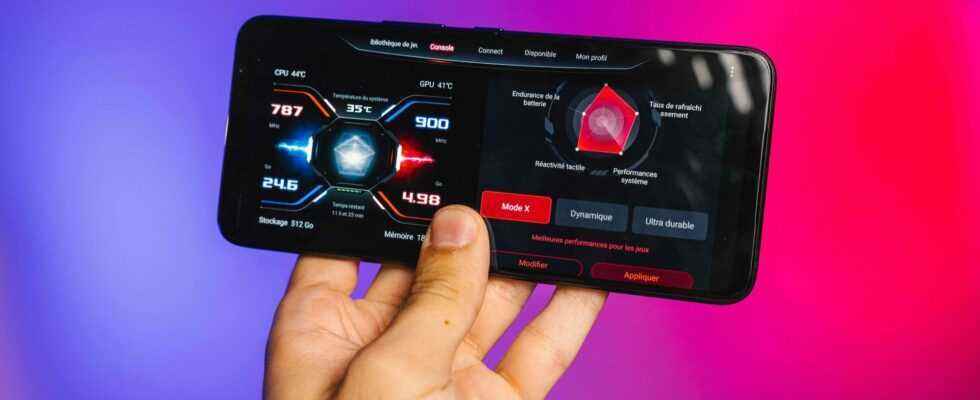The ROG Phone 6 Pro is a premium smartphone through and through. Before publishing its full test, we give you an overview of its performance.
Here, there is no question of listing all the characteristics of the ROG Phone 6 Pro, you will find them in the announcement article. We wanted to give you a taste of what this smartphone offers with its SoC Qualcomm Snapdragon 8+ Gen 1.
A revised design
To achieve optimal performance, the design of ROG Phone 6 has been thoroughly revised. First, the SoC was installed in the center of the device. It is surrounded by two large batteries. For heat dissipation, various mechanisms are used. This is what Asus calls GameCool 6. Understand here that it is a huge graphite plate whose objective is to evacuate heat as efficiently as possible.

To avoid the famous hot spot that we can easily identify after a few minutes of intense activity on a smartphone, Asus therefore tries to disperse the heat over the largest surface of the chassis possible. Which is good for him since the ROG Phone 6 is very imposing.

Technically, the SoC is placed in the center of the device with a two-part motherboard (a PCB). Same thing for the two-part battery, but also the passive cooling system, each time positioned around the SoC. This allows, in addition to better evacuating the heat, to remove the hot spot from the fingers resting on the device. Asus also uses a boron nitride thermal compound, which conducts heat two hundred times better than clean air.
Impressive first results
We were able to launch various synthetic benchmarks, in addition to launching long games (more than 30 minutes) of resource-intensive games. It is clear that the phone becomes hot, without being hot.
Thanks to this design, the ROG Phone 6 Pro limits this effect of “throttlingwhen the SoC reduces the CPU/GPU clock frequency. The goal here is to deliver stable performance even at full power.
If you ever really want to avoid overheating, Asus has also updated the AeroActive Cooler 6. This is active cooling, in the form of an accessory with RGB LEDs, which recovers the heat emitted from the back of the smartphone and evacuates it using fans. This way of doing things is the same as the fans used on PCs.

We ran various tests with X-Mode. This mode is designed not to restrict the performance of the smartphone. Obviously, it is this mode that will quickly reduce the autonomy of the device. But, we are here for performance.
Precisely… the ROG Phone 6 Pro is impressive. From what you can get, it’s the most powerful Android smartphone to date. On all the synthetic benchmarks (Geekbench 5, Antutu 9, PC Mark, GFX Bench, 3D Mark, etc.), it achieves scores above any Android smartphone passed through our hands. They even have the luxury of doing better than the iPhone 13 Pro in certain tests.
| Model | Asus ROG Phone 6 Pro | Vivo X80 Pro | Realme GT Neo 3 | Xiaomi 12 Pro | Apple iPhone 13 Pro |
|---|---|---|---|---|---|
| AnTuTu 9 | 1109651 | 974485 | 822636 | 967591 | 784475 |
| AnTuTu CPU | 262115 | 208029 | 201733 | 219760 | 219142 |
| AnTuTu GPU | 466005 | 441245 | 312601 | 424956 | 306507 |
| AnTuTu MEM | 196358 | 162886 | 149301 | 164789 | 128315 |
| AnTuTu UX | 185173 | 162325 | 159001 | 158086 | 130511 |
| PC Mark 2.0 | 41463 | N/C | N/C | N/C | N/C |
| PC Mark 3.0 | 17165 | 9067 | 14370 | 12979 | N/C |
| 3DMark Wild Life | N/C | N/C | 5441 | 7129 | 9757 |
| 3DMark Wild Life average framerate | 63 FPS | N/C | 32 FPS | 43 FPS | 58.4 FPS |
| GFXBench Aztec Vulkan/Metal high (onscreen / offscreen) | 63 / 46 FPS | 21 / 38 FPS | 43 / 28 FPS | 58 / 44 FPS | 60 / 38.8 FPS |
| GFXBench Car Chase (onscreen/offscreen) | 82 / 101 FPS | 80 / 93 FPS | 53 / 61 FPS | 73 / 91 FPS | 60 / 90.89 FPS |
| GFXBench Manhattan 3.0 (onscreen/offscreen) | 143 / 252 FPS | 120 / 241 FPS | 60 / 168 FPS | 121 / 233 FPS | N/C |
| Sequential Read/Write | 1971 / 1470 MB/s | 1858 / 1425 MB/s | 1751 / 1333 MB/s | 1827 / 1444 MB/s | N/C |
| Random read/write | 88564 / 118678 IOPS | 77781 / 98875 IOPS | 74087 / 80379 IOPS | 79899 / 105473 IOPS | N/C |
See more benchmarks
We conducted various tests, including mobile games (Genshin Impact or Diablo Immortal), not to mention Cloud Gaming services (Stadia, Xbox Game Pass Cloud)… The ROG Phone 6 Pro offers impressive performance even over time.

Add to that the functions and accessories made to measure for him. We were able to test the AeroActive Cooler 6 as a cooling system, the Kunai 3 Gamepad (controllers like the Switch), the AirTrigger ultrasonic button system… Thus, we are really faced with a smartphone cut to satisfy gamers.
The ROG Phone 6 Pro is definitely powerful
It’s simple, the ROG Phone 6 Pro excels in many areas related to video games. And we take real pleasure in playing it on its imposing 6.78-inch screen.
We’ll go into that in detail in the test, but you’ve got countless software options, a neat audio section, and a screen that scored very well in our tests. In addition, it turns into a gamepad and offers unparalleled performance today.
In short, in addition to being promising on paper, the ROG Phone 6 Pro is precisely powerful. It’s amazing what a manufacturer can do when they don’t care about creating the thinnest design with the best cameras, or if they’re stuck with an ultra-competitive price tag. Asus wasn’t afraid to get weird here and that weirdness manifests itself in a number of ways, which could make it a good choice for gamers looking for the most powerful phone out there right now. In short, the full test should not take too long.
To follow us, we invite you to download our Android and iOS application. You can read our articles, files, and watch our latest YouTube videos.
